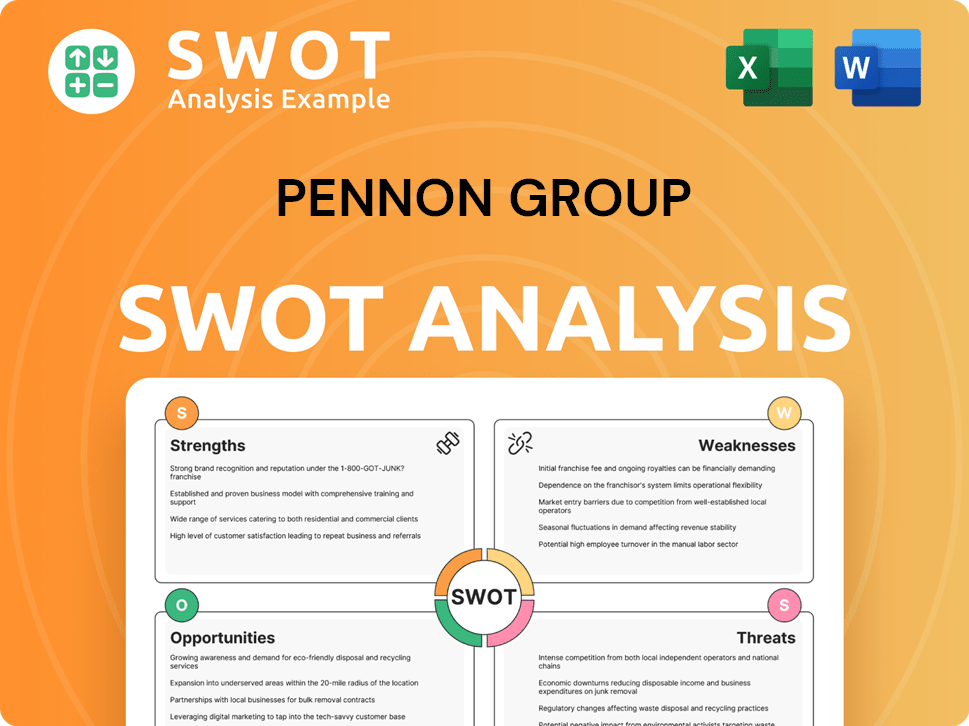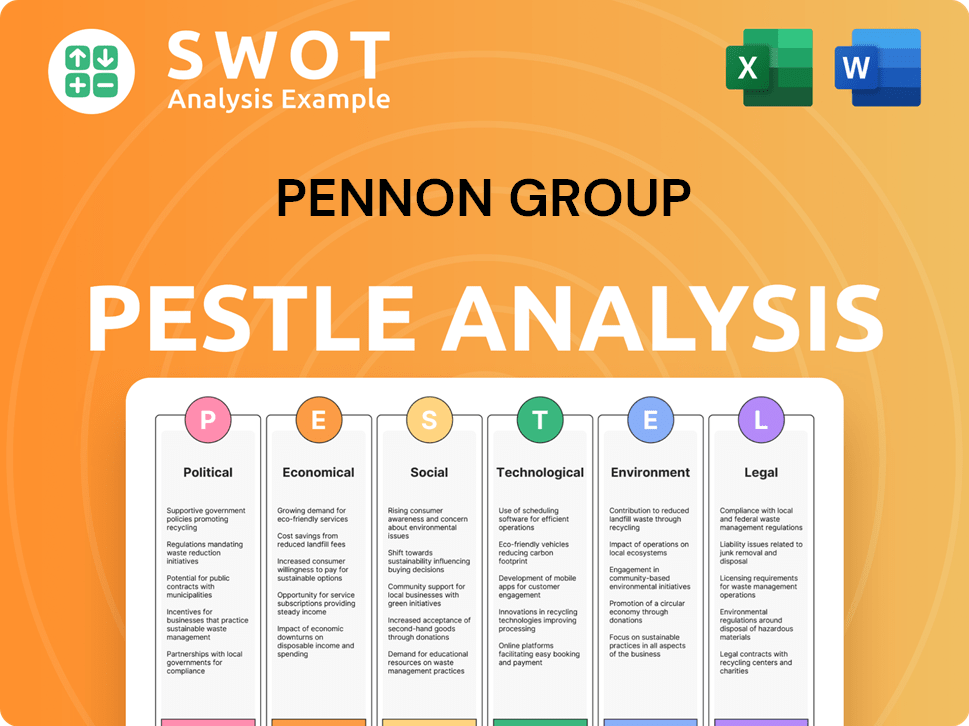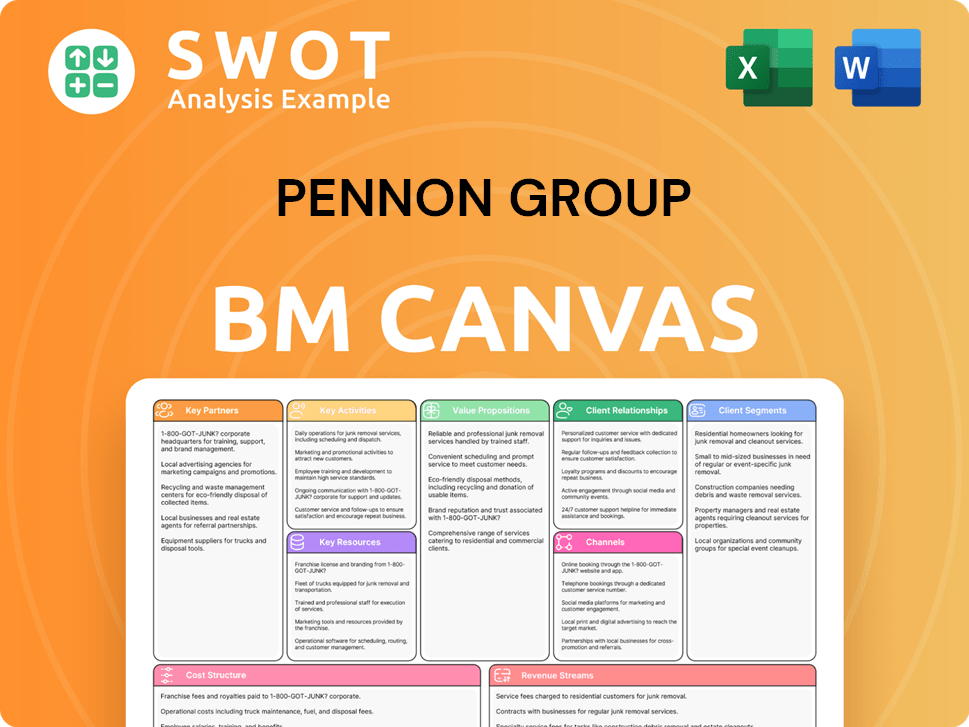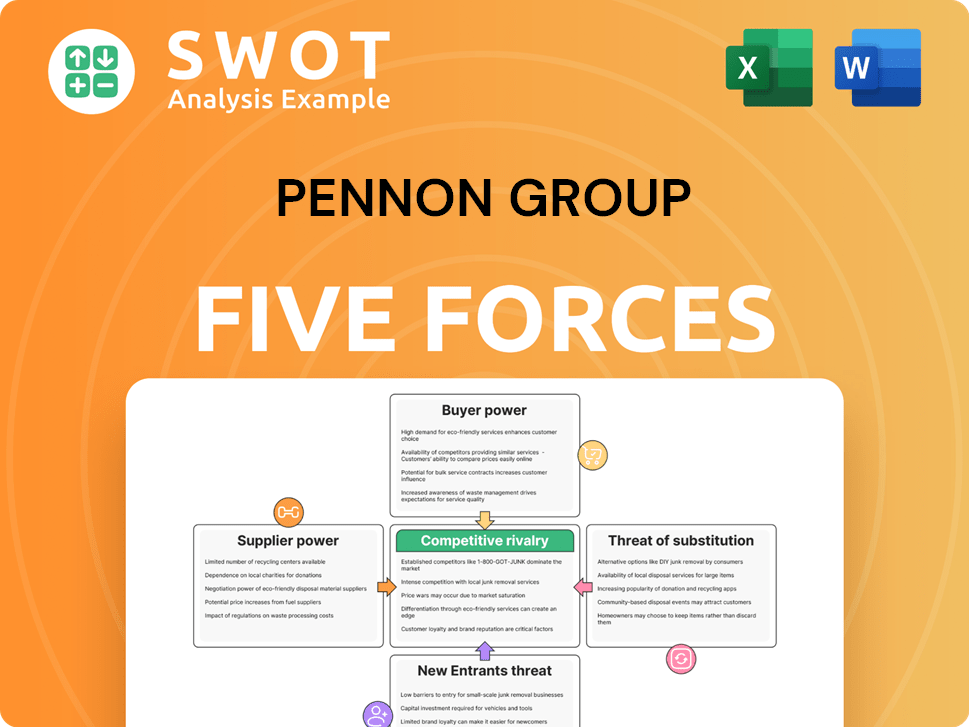Pennon Group Bundle
Who Really Owns Pennon Group?
The ownership structure of a company is a powerful determinant of its strategic direction and market performance. Pennon Group, a key player in the UK's environmental infrastructure sector, offers a fascinating case study in evolving ownership dynamics. From its roots in the privatization of the water industry to its current standing, understanding who controls Pennon Group is crucial for anyone seeking to invest or analyze its operations.

This exploration of Pennon Group SWOT Analysis will delve into the specifics of Pennon Group ownership, examining its shareholders and the evolution of its company structure. We'll trace the history of Pennon Group stock, identifying key Pennon Group investors and the individuals who shape its future. This analysis will also cover the implications of these ownership trends on Pennon Group's financial performance and its commitment to environmental initiatives, providing a comprehensive view of this important utility company.
Who Founded Pennon Group?
The origins of the Pennon Group trace back to the privatization of the water industry in England and Wales in 1989. Unlike companies founded by individual entrepreneurs, Pennon Group, initially known as South West Water, emerged as a publicly listed entity during this period of government divestiture. The initial ownership structure was dispersed among a wide array of public shareholders who acquired shares during the privatization process.
In essence, the 'founding ownership' of Pennon Group comprised the initial distribution of shares to investors who participated in the flotation. There wasn't a specific group of individual founders with a conventional equity split. Instead, the ownership was broadly distributed among those who invested in the newly privatized entity. This approach differed significantly from the typical startup model, where ownership is concentrated among a few founders and early investors.
Early ownership agreements were governed by the privatization terms, including regulatory frameworks for utility companies. These frameworks set out dividend policies, investment needs, and customer service standards. These elements shaped the value and appeal of holding shares in the newly privatized company. The primary aim, as defined by the privatization policy, was to create efficient, privately run water companies capable of attracting capital for essential infrastructure upgrades. The focus was on attracting a broad base of public and institutional investors rather than relying on angel investors or family and friends.
The privatization of South West Water, later Pennon Group, involved an IPO. This was the mechanism by which the government sold its stake to the public.
The initial shareholder base was diverse, including both institutional investors and individual shareholders. This broad distribution was a key feature of the privatization.
The regulatory environment shaped the company's operations. Compliance with regulations was crucial for maintaining shareholder value.
Dividend policies were a key factor for investors. The ability to pay dividends influenced the attractiveness of Pennon Group stock.
A key goal of privatization was to attract investment for infrastructure improvements. This was a significant factor for Pennon Group.
Customer service standards were a key part of the regulatory framework. They influenced the company's reputation and financial performance.
The initial distribution of shares in Pennon Group was a critical aspect of its foundation. Understanding the initial Pennon Group ownership structure helps to understand how the company evolved. The Pennon Group shareholders, comprising a diverse group of investors, played a crucial role in the company's early development. For more insights into the business strategies, you can explore the Marketing Strategy of Pennon Group.
The early ownership of Pennon Group was characterized by a broad distribution of shares among public and institutional investors, shaped by the privatization process.
- The company's foundation was rooted in the privatization of the water industry.
- The initial ownership structure was dispersed, not concentrated.
- Regulatory frameworks played a significant role in shaping the company's operations and shareholder value.
- The focus was on attracting capital for infrastructure improvements.
Pennon Group SWOT Analysis
- Complete SWOT Breakdown
- Fully Customizable
- Editable in Excel & Word
- Professional Formatting
- Investor-Ready Format

How Has Pennon Group’s Ownership Changed Over Time?
The ownership structure of Pennon Group has evolved significantly since its initial public offering (IPO) in 1989. As a publicly traded entity on the London Stock Exchange, its shares are held by a diverse group of investors. This includes institutional investors, mutual funds, index funds, and individual shareholders. Major shifts in shareholding often occur due to large-scale institutional investments, divestments, or changes in fund mandates. Understanding the dynamics of Pennon Group ownership is crucial for assessing its strategic direction and financial performance. This also helps in understanding the influence of major shareholders on the company's operations and future plans.
As of early 2024, the major shareholders of Pennon Group include significant institutional investors. BlackRock, Inc. is often reported as a key shareholder, with its various funds holding a notable percentage of the company's shares. Other prominent institutional investors frequently include investment management firms like Vanguard Group, Legal & General Investment Management, and Norges Bank Investment Management. These institutional holdings collectively represent a substantial portion of Pennon's market capitalization, which stood at approximately £1.9 billion as of June 2024. The concentration of ownership among large institutional investors can influence company strategy through their voting power on resolutions and engagement with management. The divestment of Viridor in 2020 for £4.2 billion significantly altered Pennon's asset base and, consequently, its investor appeal, refocusing the company primarily on regulated water and wastewater services. For a deeper dive into the company's strategic direction, consider reading about the Growth Strategy of Pennon Group.
| Key Event | Impact on Ownership | Date |
|---|---|---|
| Initial Public Offering (IPO) | Established public ownership structure | 1989 |
| Divestment of Viridor | Refocused company on water and wastewater services, altered investor appeal | 2020 |
| Institutional Investment Changes | Influenced company strategy through voting power and engagement | Ongoing |
The evolution of Pennon Group's ownership reflects broader trends in the investment landscape. The presence of large institutional investors, such as BlackRock and Vanguard, highlights the importance of Environmental, Social, and Governance (ESG) factors in shaping the company's operational decisions. Changes in major shareholdings, as disclosed through filings, provide insights into investor confidence and strategic interest in the utilities sector. The company's focus on regulated water and wastewater services, following the Viridor divestment, has further refined its investor profile and strategic direction, making it a key player in the sector.
Pennon Group's ownership is primarily held by institutional investors, influencing its strategic direction.
- BlackRock and Vanguard are among the major shareholders.
- The Viridor divestment in 2020 significantly reshaped the company's focus.
- Changes in shareholdings signal shifts in investor confidence.
- The company's market capitalization was approximately £1.9 billion as of June 2024.
Pennon Group PESTLE Analysis
- Covers All 6 PESTLE Categories
- No Research Needed – Save Hours of Work
- Built by Experts, Trusted by Consultants
- Instant Download, Ready to Use
- 100% Editable, Fully Customizable

Who Sits on Pennon Group’s Board?
The Board of Directors at Pennon Group oversees the company's strategic direction and governance. As of early 2024, the board is composed of a mix of executive and non-executive directors, bringing diverse expertise in finance, utilities, and corporate governance. The structure typically includes a Chair, Chief Executive Officer, Chief Financial Officer, and several independent non-executive directors. The independent directors are crucial for providing objective oversight and representing shareholder interests. Understanding the Pennon Group ownership structure is key to evaluating its governance.
The board's composition reflects a commitment to robust governance, with independent directors playing a significant role. This structure aims to ensure accountability to shareholders. The board's decisions directly influence the company's performance and its relationship with Pennon Group shareholders and Pennon Group investors.
| Director | Role | Notes (as of early 2024) |
|---|---|---|
| Susan Davy | Chief Executive Officer | Leads the executive team and is responsible for the company's overall performance. |
| Paul Pester | Chair | Provides leadership to the board and ensures effective governance. |
| John Isaac | Chief Financial Officer | Oversees the financial strategy and reporting. |
The voting structure at Pennon Group follows the 'one-share-one-vote' principle, common among companies listed on the London Stock Exchange. This means that voting power is directly proportional to the number of shares held. Major shareholders, including institutional investors, influence decisions at annual general meetings (AGMs) through their collective voting power. The focus on independent directors and the 'one-share-one-vote' system supports strong governance and alignment with shareholder interests. If you're interested in how to buy Pennon Group stock, understanding this structure is essential.
The Board of Directors at Pennon Group includes both executive and independent non-executive directors, ensuring a balance of expertise and oversight. The 'one-share-one-vote' structure provides transparency and fairness in voting rights.
- The board's composition reflects a commitment to strong governance.
- Major shareholders exert influence through their voting power at AGMs.
- Understanding the Pennon Group ownership structure is essential for investors.
- The company's governance aims to align with shareholder interests.
Pennon Group Business Model Canvas
- Complete 9-Block Business Model Canvas
- Effortlessly Communicate Your Business Strategy
- Investor-Ready BMC Format
- 100% Editable and Customizable
- Clear and Structured Layout

What Recent Changes Have Shaped Pennon Group’s Ownership Landscape?
Over the past few years, the ownership structure of Pennon Group has seen some notable shifts. A key development was the sale of its waste management business, Viridor, in July 2020. This transaction, valued at £4.2 billion, allowed Pennon Group to focus solely on its water and wastewater operations, primarily serving the South West of England. This strategic move likely influenced the type of Pennon Group investors attracted to the company, drawing those interested in the stable, regulated returns typical of the water utility sector.
The Pennon Group ownership has also been influenced by industry trends. Utility companies often experience increased institutional ownership, with large asset managers and pension funds seeking steady returns. These investors are increasingly focused on environmental, social, and governance (ESG) performance. Pennon Group is investing heavily in its infrastructure and environmental programs, allocating over £2 billion by 2025 for improvements. This aligns with the ESG mandates of many institutional investors. The company's recent equity raise of £180 million in May 2024, aimed at strengthening its balance sheet, also represents a recent shift in its capital structure, impacting its Pennon Group shareholders composition.
The company's commitment to environmental improvements and network resilience, as part of its business plan, reflects a broader trend in the utility sector. For more details on the company's operations, consider reading Revenue Streams & Business Model of Pennon Group. This focus on ESG factors and infrastructure investments is a key consideration for Pennon Group investors and influences the company's long-term strategy and ownership dynamics.
Divestment of Viridor in July 2020 for £4.2 billion, streamlining focus.
Increased institutional ownership, focusing on ESG performance.
Over £2 billion allocated by 2025 for environmental improvements.
Equity raise of £180 million in May 2024 to strengthen the balance sheet.
Pennon Group Porter's Five Forces Analysis
- Covers All 5 Competitive Forces in Detail
- Structured for Consultants, Students, and Founders
- 100% Editable in Microsoft Word & Excel
- Instant Digital Download – Use Immediately
- Compatible with Mac & PC – Fully Unlocked

Related Blogs
- What are Mission Vision & Core Values of Pennon Group Company?
- What is Competitive Landscape of Pennon Group Company?
- What is Growth Strategy and Future Prospects of Pennon Group Company?
- How Does Pennon Group Company Work?
- What is Sales and Marketing Strategy of Pennon Group Company?
- What is Brief History of Pennon Group Company?
- What is Customer Demographics and Target Market of Pennon Group Company?
Disclaimer
All information, articles, and product details provided on this website are for general informational and educational purposes only. We do not claim any ownership over, nor do we intend to infringe upon, any trademarks, copyrights, logos, brand names, or other intellectual property mentioned or depicted on this site. Such intellectual property remains the property of its respective owners, and any references here are made solely for identification or informational purposes, without implying any affiliation, endorsement, or partnership.
We make no representations or warranties, express or implied, regarding the accuracy, completeness, or suitability of any content or products presented. Nothing on this website should be construed as legal, tax, investment, financial, medical, or other professional advice. In addition, no part of this site—including articles or product references—constitutes a solicitation, recommendation, endorsement, advertisement, or offer to buy or sell any securities, franchises, or other financial instruments, particularly in jurisdictions where such activity would be unlawful.
All content is of a general nature and may not address the specific circumstances of any individual or entity. It is not a substitute for professional advice or services. Any actions you take based on the information provided here are strictly at your own risk. You accept full responsibility for any decisions or outcomes arising from your use of this website and agree to release us from any liability in connection with your use of, or reliance upon, the content or products found herein.